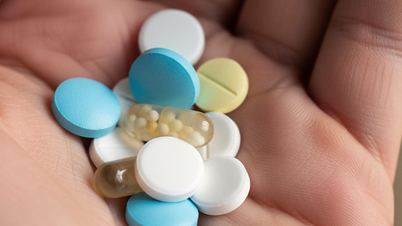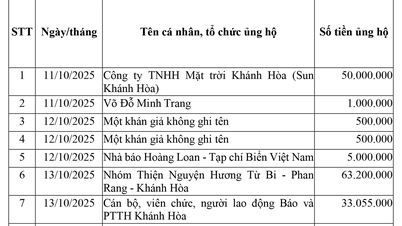
Entering middle age, the body begins to change silently, metabolism slows down, resistance decreases, and organs gradually "degrade" - Photo: Dailymail
A seemingly simple blood test can be a "detailed report" on each person's health status. According to Dr. Dean Eggitt, medical expert and CEO of Doncaster Local Health Board (UK), regular blood monitoring is one of the most effective measures to help people live healthy, live long and proactively prevent diseases.
"The body after age 40 is like a car that has run tens of thousands of kilometers, still working well, but if not regularly maintained, everything will deteriorate faster than you think," Dr. Eggitt shared.
He believes that middle age is an important stage to check biological indicators, especially through blood, which accurately reflects the condition of most organs in the body.
Here are four important tests doctors recommend getting done regularly after age 40.
Blood lipid test: A mirror reflecting cardiovascular health
Cholesterol is a fat that plays an important role in cell membrane structure and hormone production. However, an imbalance between "good" cholesterol (HDL) and "bad" cholesterol (LDL) can cause a series of dangerous cardiovascular problems. When LDL accumulates in the artery walls, it creates plaque, causing blood vessels to narrow, increasing the risk of high blood pressure, stroke and heart attack.
According to the UK National Health Service (NHS), ideal cholesterol levels are non-HDL below 4 mmol/L and HDL above 1.0 mmol/L for men or 1.2 mmol/L for women. In middle age, the body's ability to remove bad cholesterol declines, making blood lipid testing especially important.
A lipid test not only measures cholesterol, but also assesses levels of triglycerides, a common form of fat found in everyday foods. High triglyceride levels are often associated with diabetes, obesity, or fatty liver disease.
Dr. Eggitt recommends that controlling blood lipids should start with lifestyle: eat less saturated fat, reduce alcohol, increase green vegetables and fish.
Maintaining at least 150 minutes of exercise each week helps improve circulation and reduce bad cholesterol. In some cases, your doctor may prescribe cholesterol-lowering medication if your blood cholesterol levels exceed dangerous levels.
Check kidney function: Protect the body's "filter"
The kidneys are responsible for filtering blood, eliminating toxins, maintaining water, salt and mineral balance, and controlling blood pressure. When kidney function declines, toxins accumulate, affecting the entire body without the patient noticing for a long time.
A blood test to measure creatinine levels is the simplest way to assess kidney function. When creatinine levels are high, it is a warning sign that the kidneys are not working effectively. Chronic kidney disease is a disease that progresses silently and is only detected in the severe stages, when treatment becomes difficult.
Statistics show that at least one million people are living with kidney disease without knowing it. Common causes are age, high blood pressure or diabetes.
Therefore, regular kidney function testing can help detect and prevent serious complications such as heart failure, stroke or chronic hypertension.
Blood sugar test: Identify the "silent enemy" of diabetes
High blood sugar is a risk factor for a host of chronic diseases, from obesity to heart disease to stroke. Dr. Eggitt calls diabetes a “systemic inflammatory disease,” because it damages every organ in the body over time.
To check blood sugar, the HbA1c test is the gold standard. This test reflects the average blood sugar level over the past 2–3 months. If the HbA1c index is high, the patient is at risk of having or is in the pre-diabetes stage.
Chronically high blood sugar can lead to complications such as nerve damage in the hands and feet, vision loss, kidney failure, and even ketoacidosis – a life-threatening condition. However, blood sugar can fluctuate temporarily due to stress, illness, or lack of exercise, so it is important to maintain a stable lifestyle and check regularly.
A sensible diet low in refined sugars and high in fiber, maintaining a healthy weight, and regular exercise can help keep blood sugar under control. "There's no magic bullet other than being proactive about taking care of yourself every day," Dr. Eggitt emphasizes.

There are now many easy-to-use devices that can monitor blood pressure at home - Illustration photo
Blood Pressure Monitoring: A Vital Indicator That Cannot Be Ignored
Although it is not a blood test, measuring blood pressure is an important tool to assess overall cardiovascular health. Tens of millions of people worldwide live with high blood pressure, and half of them have it uncontrolled.
High blood pressure is diagnosed when a home reading is 135/85 mmHg or higher, or 140/90 mmHg when measured at a medical facility. Healthy blood pressure ranges from 90/60 mmHg to 120/80 mmHg, and people over 40 should keep it at around 115/75 mmHg to reduce cardiovascular risk.
High blood pressure often has no obvious symptoms, but silently damages blood vessel walls, increasing the burden on the heart and kidneys. The good news is that this condition can be easily controlled by making lifestyle changes: losing weight, eating a low-salt diet, limiting alcohol and coffee, and maintaining regular exercise.
40 is not the end of youth, but the beginning of a conscious health journey. Each blood test is not just a meaningless number, but a reminder to listen to your body, detect the smallest changes early to live a healthier and more fulfilling life.
Health is not something we lose in a day, but the result of small choices, repeated every day. And each blood test is an opportunity for us to understand and protect ourselves better.
Source: https://tuoitre.vn/bon-xet-nghiem-nen-thuc-hien-sau-tuoi-40-de-song-khoe-manh-hon-20251026211808591.htm


![[Photo] Party Committees of Central Party agencies summarize the implementation of Resolution No. 18-NQ/TW and the direction of the Party Congress](https://vphoto.vietnam.vn/thumb/1200x675/vietnam/resource/IMAGE/2025/10/27/1761545645968_ndo_br_1-jpg.webp)
![[Photo] The 5th Patriotic Emulation Congress of the Central Inspection Commission](https://vphoto.vietnam.vn/thumb/1200x675/vietnam/resource/IMAGE/2025/10/27/1761566862838_ndo_br_1-1858-jpg.webp)
![[Photo] National Assembly Chairman Tran Thanh Man receives Chairman of the House of Representatives of Uzbekistan Nuriddin Ismoilov](https://vphoto.vietnam.vn/thumb/1200x675/vietnam/resource/IMAGE/2025/10/27/1761542647910_bnd-2610-jpg.webp)










































































































Comment (0)